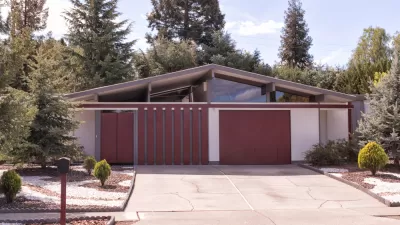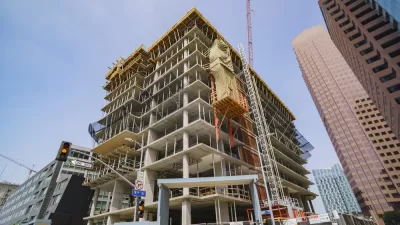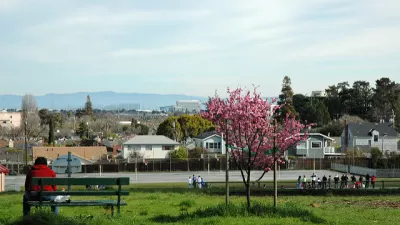A 35-year-old law is not living up to its moniker, the 'anti-NIMBY law'. A bill co-sponsored by a group associated with the YIMBY movement would fine cities $10,000 per housing unit if they fail to comply with the law.

One reason why California isn't building enough housing is because city councils ignore existing housing laws that, if followed, would result in more housing construction.
"A textbook example is playing out in Berkeley, which was sued last fall over a small housing development it denied," reports Katy Murphy, who covers state government for The Mercury News.
In February, the Berkeley City Council defied a court order to approve the development. The 35-year-old law — known colloquially as the “anti-NIMBY (Not In My Backyard) Act” — limits a city’s ability to reject a project that meets its zoning and land-use requirements.
Under a bill by Sen. Nancy Skinner, D-Oakland, cities like Berkeley that don’t comply with a court order would be hit with automatic fines of $10,000 per housing unit.
“SB 167 strengthens the Housing Accountability Act to help limit the denial of good housing projects that otherwise meet all local laws,” states Senator Skinner The bill, sponsored by the California Apartment Association and the California Renters Legal Advocacy and Education Fund (CaRLA), the legal advocacy arm of the YIMBY Party, has passed the Assembly and is before the Assembly Rules Committee.
The Berkeley lawsuit, now in its second iteration, was the first to be initiated by CaRLA. The group's second lawsuit, against the Contra Costa County suburb of Lafayette, was the basis of a "Sue the Suburbs" campaign after the city council approved a plan for 44 single-family homes on a property formerly considered for 315 apartments. The group lost at trial court, emailed spokesperson Sonja Trauss.
According to a 2014 blog by Reuben, Junius & Rose, LLP, the act, which had been used successfully against San Francisco and Stanislaus counties, could become a useful tool for developers to "protect well-thought-out, code and plan complying projects from unnecessary changes and size reductions." Should SB 167 become law, that possibility becomes more likely.
No net loss zoning
Finally, Sen. Skinner has also authored an accompanying bill, SB 166 on the subject of residential density and affordability, which "amends California’s existing ‘No Net Loss’ zoning law, ensuring that cities maintain an ongoing supply of identified sites for housing construction at each income level," according to her office.
For example, if a local government approves a commercial development on a site previously identified for housing, then SB 166 requires a city to identify a new site to accommodate this displaced housing.
The bill, co-sponsored by the California Rural Legal Assistance Foundation, Public Advocates, and the Western Center on Law and Poverty, has passed the Senate and is before the Assembly Rules Committee.
Other housing legislation advancing this term
- Three other key housing bills before the legislature, SB 2, SB 3, and SB 35 were the topic a post last week, "California's Housing Bills Fall Short."
- SB 35 and AB 199 are the topic of a commentary on how they would exacerbate the housing crisis.
- An inclusionary zoning bill, AB-1505 by Assemblyman Richard Bloom, D-Santa Monica, has passed the Assembly and is before the Senate Transportation and Housing Committee.
FULL STORY: Housing crisis: Will California force its cities to OK more building?

Planetizen Federal Action Tracker
A weekly monitor of how Trump’s orders and actions are impacting planners and planning in America.

DARTSpace Platform Streamlines Dallas TOD Application Process
The Dallas transit agency hopes a shorter permitting timeline will boost transit-oriented development around rail stations.

Four Reasons Urban Planners Can’t Ignore AI
It’s no longer a question of whether AI will shape planning, but how. That how is up to us.

Amtrak’s Borealis Exceeds First Year Ridership Expectations
205,800 passengers have boarded the St. Paul to Chicago line, well above initial MDOT projections.

Study: 4% of Truckers Lack a Valid Commercial License
Over 56% of inspected trucks had other violations.

Chicago Judge Orders Thousands of Accessible Ped Signals
Only 3% of the city's crossing signals are currently accessible to blind pedestrians.
Urban Design for Planners 1: Software Tools
This six-course series explores essential urban design concepts using open source software and equips planners with the tools they need to participate fully in the urban design process.
Planning for Universal Design
Learn the tools for implementing Universal Design in planning regulations.
City of Mt Shasta
City of Camden Redevelopment Agency
City of Astoria
Transportation Research & Education Center (TREC) at Portland State University
US High Speed Rail Association
City of Camden Redevelopment Agency
Municipality of Princeton (NJ)





























